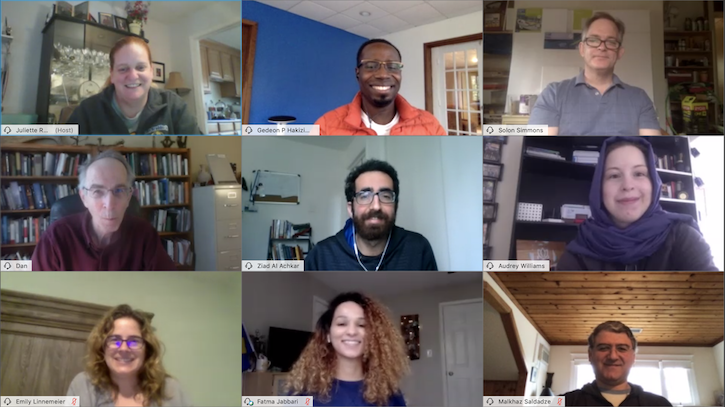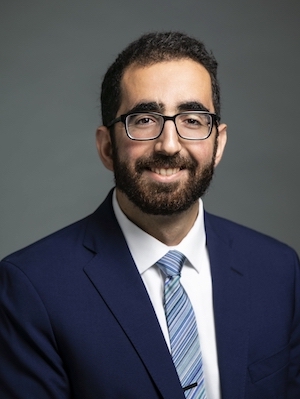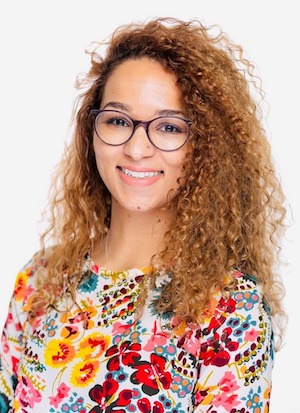
Members of the S-CAR community gathered on WebEx on March 18, 2020, for one of a variety of in-house workshops and trainings to get faculty and instructors ready for the transition to online course delivery as part of Mason’s response to COVID-19.
On March 12, George Mason University joined a growing number of universities and colleges across the United States in announcing that it would be moving all of its Spring 2020 courses to online delivery in an effort to stem the spread of the novel coronavirus, also referred to as COVID-19, the disease it causes.
When Ziad Al Achkar and Fatma Jabbari, who are both PhD students and graduate teaching assistants (GTAs) at the School for Conflict Analysis and Resolution, learned that they and their colleagues would have only an extra week of extended spring break to move their coursework online, they did what academics do best when confronted with unexpected and novel information: study, research, and test.

Ziad Al Achkar, PhD student and GTA at S-CAR
“I really have never taught before online,” said Al Achkar, who is serving as a GTA for Theories of Conflict and Resolution (CONF 2010) with S-CAR assistant professor Douglas Irvin-Erickson. “When I first heard about this virtual transition, I went online [to] spend some time learning about Blackboard functions, read their help pages, and really just spend time playing around to test and learn the functionality.”
Mason students can access their courses, including online sessions, through Mason’s Blackboard site.
It’s a problem-solving approach he shares with Jabbari, who also “learned by doing” when it came to online teaching tools.
As classes resume virtually during the week of March 23, their initiative will benefit not just their own students but also those of their colleagues at the school. In addition to learning how to transition their own classes online, Al Achkar and Jabbari spent their extra week of spring break compiling resources and guiding virtual workshops for their colleagues.
“[Fatma and Ziad have] been a godsend for faculty making the transition to online learning by leading seminars and patiently answering questions. I personally would be far less prepared without them,” said Thomas Flores, who is an associate professor of conflict resolution and political science at the school.
Jabbari and Al Achkar have been supported in this initiative by faculty members who have their own experience with online instruction, including Julie Shedd, an associate professor who also serves as the school’s associate dean, and Daniel Rothbart, a professor of conflict analysis and resolution.
Online delivery poses challenges—and opportunities
On Wednesday, March 18, a day after Mason announced that virtual instruction would be extended through the end of the spring semester rather than through April 3 as initially planned, Jabbari, Al Achkar, Rothbart, and Shedd could be found not on campus but on a WebEx call set up to guide the school’s faculty and instructors through the process of using Blackboard Collaborate Ultra for virtual class sessions.
The workshop was led by Rothbart, with Jabbari and Al Achkar jumping in with suggestions for effective online instruction. The discussion covered not just the basic logistics of setting up a virtual classroom but also best practices for the facilitation of online discussion and the accommodation of student needs.
This unprecedented, comprehensive switch of faculty to online teaching—and students to online learning—is likely to come with challenges.
Jabbari noted that many students who rely on university-provided technology and internet connection may no longer have reliable access due to Mason limiting on-campus residency to exceptional cases. Therefore, it is important for faculty to provide opportunities for students to engage in online discussion and coursework outside of virtual class periods.

Fatma Jabbari, PhD student and GTA at S-CAR
“I think my end goal is basically to balance the synchronous and asynchronous ways of virtual teaching and learning, and to have something stable for students and for faculty,” Jabbari told S-CAR News during a conversation immediately following the March 18 workshop.
She is currently serving as a GTA for Conflict and Our World (CONF 101) with S-CAR associate professor Solon Simmons.
Rothbart noted that the tenor of class discussions may also change with this switch.
As students are exposed to each other’s viewpoints and learning approaches over the semester, they tend to begin sharing observations that are more personal or controversial, thus enriching class discussion.
“It’s a matter of everyone feeling comfortable that they can do that,” Rothbart said.
The switch to online delivery could change that comfort level, particularly since Rothbart plans on letting his students know that his class sessions will be recorded.
“I think that will take time for some people [to feel comfortable again],” he said.
The key to managing these challenges, according to Al Achkar, will be maintaining flexibility and listening to what students have to say about how online instruction is working for them.
“It’s important to hear the voices of our students as to what they think can be done better, or what they’ve liked, and kind of build from there,” he said.
According to Shedd, it’s also important to remember that while a sudden transition to online instruction may be challenging to manage, online courses in general can provide many benefits for students.
For example, online learning can provide greater accessibility to students who work full-time, have disabilities, or are otherwise unable to regularly come to campus.
“In my experience, there [are] some people for whom online classes actually work an awful lot better, because it matches their learning style,” Shedd said.
In recognition of these benefits, S-CAR has been increasing its online course offerings over the last decade, and the school launched an online Master’s of Science in Conflict Analysis and Resolution in 2013.
Jabbari is hopeful that this transition to online delivery will improve learning outcomes down the road by encouraging faculty and instructors to become more adaptable in their teaching styles.
“We need to have a very hybrid, problem-solving-oriented kind of teaching style that can accommodate both [in-person and virtual instruction], and I think this is the opportunity for us to work on that,” she said.
How prospective students can connect with us virtually
Are you a prospective student hoping to join our school in the fall? We may not be able to host you on campus right now, but you can connect with us by:
- requesting to visit one of our classes virtually; or
- chatting about our school with a current student.
To learn more about these options and express interest, reach out via email to scarinfo@gmu.edu.
Prospective students can also reach out to scaradvi@gmu.edu to set up individual advising appointments. Please be aware that S-CAR staff members are currently teleworking, and so email is the easiest way to be in contact.
Building community in a time of COVID-19
One of the greatest concerns for faculty and students alike during the coronavirus pandemic has been its impact on the sense of community at the school.
“I think one of the big challenges [of online instruction] is building community and a sense of presence,” said Shedd.
In her previous online classes, Shedd has approached this challenge by encouraging students to record video introductions to help them get to know each other. She has also made ample use of small discussion groups, making sure to keep the same set of students together throughout the semester so that “they’re able to really build on their knowledge of each other’s opinions.”
What she has found is that while online community may be different than in-person community, it brings its own benefits for its members.
“Interestingly, our online-only students actually have kind of their own community,” she said. “They show up in different classes together, and they’re working on different projects.”
For many of the school’s faculty members and instructors, community in the time of COVID-19 has taken an early, concrete form in Jabbari’s and Al Achkar’s efforts to get their colleagues up-to-speed on online delivery.
“At times like this, we are reminded of the true value of being part of an academic community,” said Tehama Lopez Bunyasi, an assistant professor at the school. “It is heartening and humbling to see our graduate students step up to the plate to guide peers and faculty members alike through the challenges of utilizing online instructional tools.”
For both Jabbari and Al Achkar, there was never a question of sharing what they have learned about online instruction with their colleagues.
“I didn’t blink or think twice before just stepping in,” said Jabbari, who is already working with the school’s leadership to see if online teaching and learning workshops can be incorporated into all of the school's orientations going forward. “If I know something, I would share it with anyone. I would make the process easier for everybody.”
For Rothbart, the reason for taking part in faculty training on such short notice is simple.
“We want the Carter School to flourish,” he said, referencing the upcoming July launch of the school’s new name, the Jimmy and Rosalynn Carter School for Peace and Conflict Resolution.
According to Shedd, the fact that the school has been able to receive this training in-house has been an advantage, and it reflects back on its longstanding culture of cooperation.
“We have not ever had really rigid hierarchy around the relative roles of faculty and students, particularly PhD students,” she said. This “collegial relationship” has gone a long way toward preparing the school’s faculty and instructors for the online switch.
Shedd has been particularly impressed by how far this spirit of cooperation has extended.
“It’s funny. I’ve had more people offer to help than I’ve had people ask for individual help,” she said.
For Rothbart, the school’s academic focus on responses to conflicts from the interpersonal to the global has also given it an advantage when it comes to responding to the current pandemic’s impact on its community.
“We always talk about the community. Well, this is a community crisis,” he said. “This is conflict management. This is like a little metaphor of dealing with conflict situations.”
This conflict management response isn’t just logistical—it is also emotional. As the school’s faculty and instructors take their courses online, they are also keen not to lose sight of the extra toll that crisis situations can take on students, who all have different circumstances to manage, even in the best of times.
Resources for student and staff well-being
Times of crisis can introduce new stressors or exacerbate existing ones—from the financial to the emotional.
If you’re a Mason student or employee who is feeling anxiety, dealing with financial stress, or experiencing other adverse circumstances compounded by this crisis, here are some resources that may help.
In the case of Jabbari and Al Achkar, the two PhD students have taken on the responsibility of helping their colleagues prepare for online instruction even as they complete their own coursework and grapple with various student-specific challenges associated with the coronavirus pandemic.
For example, as international students—Jabbari is from Tunisia, and Al Achkar is from Lebanon—both were forced to wonder how the jump to online learning would impact their visa status. Students on F-1 visas are normally only allowed one online or distance-learning course per semester.
News that the U.S. Department of State would be relaxing these limits during the current health emergency came as a relief.
Even as the school’s faculty and instructors deal with stressors unique to their own situations, they are committed to helping their students through this unusual period any way they can.
“We’re going to do the best we can to give the best learning experience that we possibly can for the rest of the semester,” said Shedd. “It may not always be perfect and work perfectly and have everything that a student might want it to have, but there’s a real commitment by everyone to make this the best learning experience that we can to help everybody achieve their goals in their classes this spring.”
She noted that this commitment has included checking in on students who might already have been more isolated from the school’s community, such as those currently conducting fieldwork.
To make this transition less stressful, Al Achkar mentioned that he’ll be taking steps to ensure that his students have a chance to connect with him and each other outside of normal class periods, such as by opening up course sessions a little early so that students can chat with each other before class and by keeping virtual office hours.
“One of the things I want to emphasize and I’ll keep re-emphasizing to my students is that it’s okay to feel that things are not going well. It’s okay to be able to take the time for yourself, whether it means stepping back [or] reaching out for help,” Al Achkar said.
“We’re all in this together, after all. If it’s not in times of crises, I don’t know when.”
